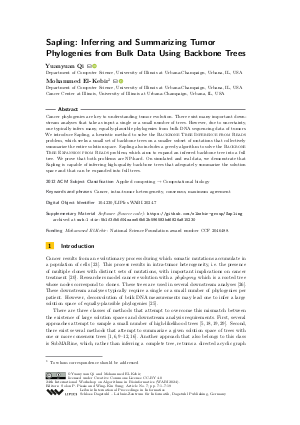Sapling: Inferring and Summarizing Tumor Phylogenies from Bulk Data Using Backbone Trees
Authors
Yuanyuan Qi  ,
Mohammed El-Kebir
,
Mohammed El-Kebir 
-
Part of:
Volume:
24th International Workshop on Algorithms in Bioinformatics (WABI 2024)
Part of: Series: Leibniz International Proceedings in Informatics (LIPIcs)
Part of: Conference: International Conference on Algorithms for Bioinformatics (WABI) - License:
 Creative Commons Attribution 4.0 International license
Creative Commons Attribution 4.0 International license
- Publication Date: 2024-08-26
File

PDF
LIPIcs.WABI.2024.7.pdf
- Filesize: 11.55 MB
- 19 pages
Document Identifiers
Subject Classification
ACM Subject Classification
- Applied computing → Computational biology
Keywords
- Cancer
- intra-tumor heterogeneity
- consensus
- maximum agreement
Metrics
- Access Statistics
-
Total Accesses (updated on a weekly basis)
0PDF Downloads0Metadata Views
Abstract
Cancer phylogenies are key to understanding tumor evolution. There exist many important downstream analyses that take as input a single or a small number of trees. However, due to uncertainty, one typically infers many, equally-plausible phylogenies from bulk DNA sequencing data of tumors. We introduce Sapling, a heuristic method to solve the Backbone Tree Inference from Reads problem, which seeks a small set of backbone trees on a smaller subset of mutations that collectively summarize the entire solution space. Sapling also includes a greedy algorithm to solve the Backbone Tree Expansion from Reads problem, which aims to expand an inferred backbone tree into a full tree. We prove that both problems are NP-hard. On simulated and real data, we demonstrate that Sapling is capable of inferring high-quality backbone trees that adequately summarize the solution space and that can be expanded into full trees.
Cite As Get BibTex
Yuanyuan Qi and Mohammed El-Kebir. Sapling: Inferring and Summarizing Tumor Phylogenies from Bulk Data Using Backbone Trees. In 24th International Workshop on Algorithms in Bioinformatics (WABI 2024). Leibniz International Proceedings in Informatics (LIPIcs), Volume 312, pp. 7:1-7:19, Schloss Dagstuhl – Leibniz-Zentrum für Informatik (2024)
https://doi.org/10.4230/LIPIcs.WABI.2024.7
BibTex
@InProceedings{qi_et_al:LIPIcs.WABI.2024.7,
author = {Qi, Yuanyuan and El-Kebir, Mohammed},
title = {{Sapling: Inferring and Summarizing Tumor Phylogenies from Bulk Data Using Backbone Trees}},
booktitle = {24th International Workshop on Algorithms in Bioinformatics (WABI 2024)},
pages = {7:1--7:19},
series = {Leibniz International Proceedings in Informatics (LIPIcs)},
ISBN = {978-3-95977-340-9},
ISSN = {1868-8969},
year = {2024},
volume = {312},
editor = {Pissis, Solon P. and Sung, Wing-Kin},
publisher = {Schloss Dagstuhl -- Leibniz-Zentrum f{\"u}r Informatik},
address = {Dagstuhl, Germany},
URL = {https://drops.dagstuhl.de/entities/document/10.4230/LIPIcs.WABI.2024.7},
URN = {urn:nbn:de:0030-drops-206518},
doi = {10.4230/LIPIcs.WABI.2024.7},
annote = {Keywords: Cancer, intra-tumor heterogeneity, consensus, maximum agreement}
}
Author Details
- Department of Computer Science, University of Illinois at Urbana-Champaign, Urbana, IL, USA
Funding
- El-Kebir, Mohammed: National Science Foundation award number CCF 2046488.
Supplementary Materials
-
Software (Source code)
https://github.com/elkebir-group/Sapling
browse
 archived version
archived version
References
-
Aguse et al. Summarizing the solution space in tumor phylogeny inference by multiple consensus trees. Bioinformatics, 35(14):i408-i416, 2019.

-
Giulio Caravagna, Ylenia Giarratano, Daniele Ramazzotti, Ian Tomlinson, Trevor A Graham, Guido Sanguinetti, and Andrea Sottoriva. Detecting repeated cancer evolution from multi-region tumor sequencing data. Nature methods, 15(9):707-714, 2018.

-
Cayley. A theorem on trees. Quart. J. Math., 23:376-378, 1878.

-
Christensen et al. Detecting evolutionary patterns of cancers using consensus trees. Bioinformatics, 36(Supplement_2):i684-i691, 2020.

-
Deshwar et al. PhyloWGS: reconstructing subclonal composition and evolution from whole-genome sequencing of tumors. Genome biology, 16:1-20, 2015.

-
DiNardo et al. Distance measures for tumor evolutionary trees. Bioinformatics, 36(7):2090-2097, 2020.

- El-Kebir et al. Reconstruction of clonal trees and tumor composition from multi-sample sequencing data. Bioinformatics, 31(12):i62-i70, June 2015. URL: https://doi.org/10.1093/bioinformatics/btv261.
-
El-Kebir et al. Inferring the mutational history of a tumor using multi-state perfect phylogeny mixtures. Cell systems, 3(1):43-53, 2016.

-
Fu and Schwartz. ConTreeDP: A consensus method of tumor trees based on maximum directed partition support problem. In 2021 BIBM, pages 125-130. IEEE, 2021.

-
Govek et al. A Consensus Approach to Infer Tumor Evolutionary Histories. BCB, pages 63-72, 2018.

-
Govek et al. GraphyC: Using consensus to infer tumor evolution. IEEE/ACM Transactions on Computational Biology and Bioinformatics, 19(1):465-478, 2020.

- Guang et al. A weighted distance-based approach for deriving consensus tumor evolutionary trees. Bioinformatics, 39(Supplement 1):i204-i212, June 2023. URL: https://doi.org/10.1093/bioinformatics/btad230.
-
Hodzic et al. Identification of conserved evolutionary trajectories in tumors. Bioinformatics, 36(Supplement_1):i427-i435, 2020.

-
Ivanovic and El-Kebir. Modeling and predicting cancer clonal evolution with reinforcement learning. Genome Research, 33(7):1078-1088, 2023.

-
Jamal-Hanjani et al. Tracking the evolution of non-small-cell lung cancer. New England Journal of Medicine, 376(22):2109-2121, 2017.

-
Karpov et al. A multi-labeled tree dissimilarity measure for comparing “clonal trees” of tumor progression. Algorithms for Molecular Biology, 14(1):1-18, 2019.

-
Khakabimamaghani et al. Collaborative intra-tumor heterogeneity detection. Bioinformatics, 35:i379-i388, 2019.

-
Kulman et al. Reconstructing cancer phylogenies using pairtree, a clone tree reconstruction algorithm. STAR protocols, 3(4):101706, 2022.

-
Ethan Kulman, Rui Kuang, and Quaid Morris. Orchard: building large cancer phylogenies using stochastic combinatorial search. arXiv preprint arXiv:2311.12917, 2023.

- Lohr et al. Widespread genetic heterogeneity in multiple myeloma: Implications for targeted therapy. Cancer Cell, 25(1):91-101, January 2014. URL: https://doi.org/10.1016/j.ccr.2013.12.015.
-
Malikic et al. Clonality inference in multiple tumor samples using phylogeny. Bioinformatics, 31(9):1349-1356, 2015.

-
Nemirovski. Interior point polynomial time methods in convex programming. Lecture notes, 42(16):3215-3224, 2004.

-
Nowell. The clonal evolution of tumor cell populations. Science, 194(4260):23-8, October 1976.

-
Prufer. Neuer beweis eines satzes uber per mutationen. Archiv der Mathematik und Physik, 27:742-744, 1918.

- Qi et al. Implications of non-uniqueness in phylogenetic deconvolution of bulk DNA samples of tumors. Algorithms for Molecular Biology, 14(1):19, December 2019. URL: https://doi.org/10.1186/s13015-019-0155-6.
- Schwartz and Schäffer. The evolution of tumour phylogenetics: principles and practice. Nature Reviews Genetics, 18(4):213-229, April 2017. URL: https://doi.org/10.1038/nrg.2016.170.
-
Sundermann et al. Reconstructing tumor evolutionary histories and clone trees in polynomial-time with submarine. PLoS CB, 17(1):e1008400, 2021.

-
Warnow. Computational phylogenetics: an introduction to designing methods for phylogeny estimation. Cambridge University Press, 2017.

-
Wintersinger et al. Reconstructing complex cancer evolutionary histories from multiple bulk DNA samples using pairtree. Blood Cancer Discovery, 3(3):208-219, 2022.

